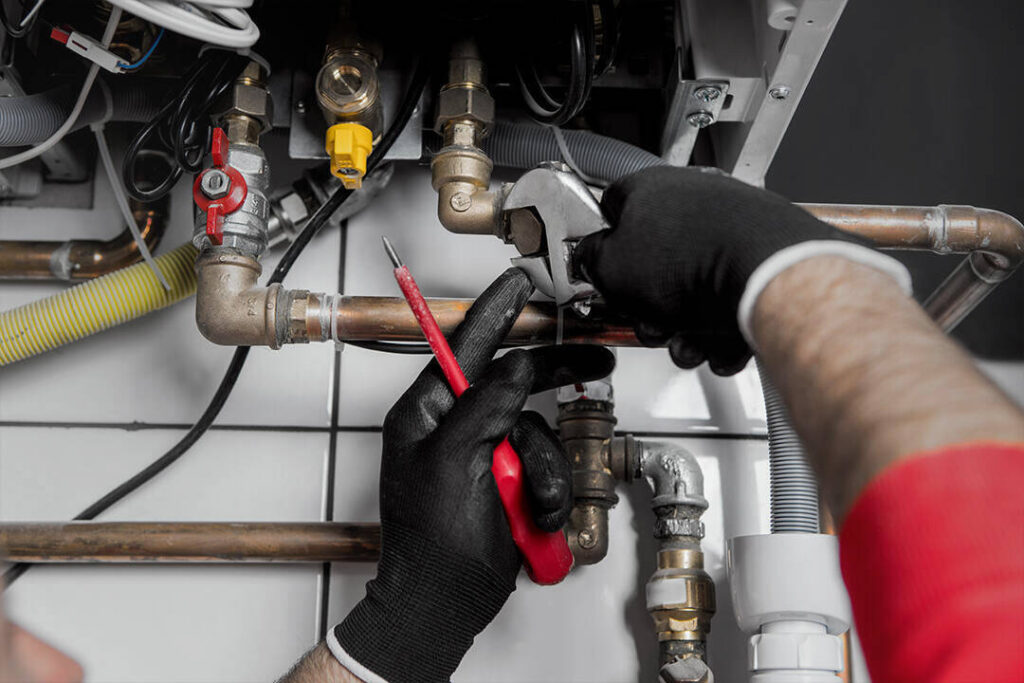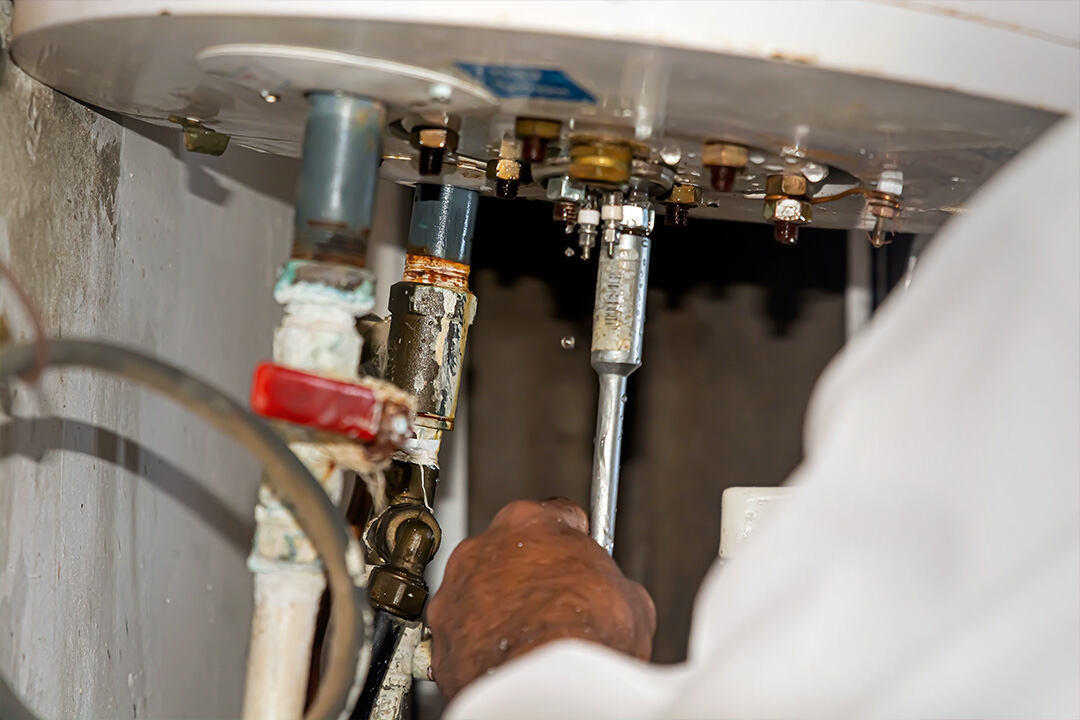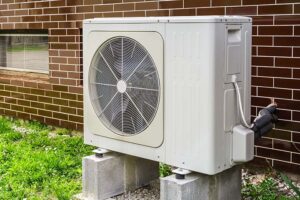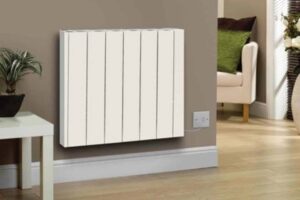Table of Contents
Dripping water from a boiler is one of the most common problems that can be concerning for homes.
Although there are many reasons a boiler might start leaking water, the most important thing is to act immediately to stop any further damage. Failure to place something properly, corrosion, or even high pressure can cause water to leak. Whatever the problem is, it needs to be fixed quickly so that your boiler can work properly again.
Hire a gas-safe resgitered installer, even if a cheaper price sounds appealing. You may have to pay later on because you’ll have to fix problems caused by a bad installation. Selecting an installer who knows the process, has high standards, and is expert with the product they install will save you from any hassle.
Moreover, this blog aims to find the most common reasons why is my boiler dripping water, how to stop the leak, and how to prevent it from happening again.
What to Do If Your Boiler Is Leaking Water?
Boiler dripping can be caused by many factors, such as high water pressure or old seals or o-rings. If your boiler is older, the problem can be with a rusted pipe or a faulty water manifold.
If you have had a new boiler installed, increased pressure on older joints can cause your system’s water leak.
It is imperative that you take action as soon as you discover a leak. Water leaking from a boiler can damage pipes, ruin them, or even get into electrical parts.
If you find a leak, you need to do the following things:
- Turn off the heat.
- Do not fill the water into the boiler.
- Use a bucket or tub to halt the water leak.
- Contact a Gas-safe engineer.
A Gas Safe-certified technician can inspect and repair your leaking boiler. Don’t fix leaking boilers yourself. You may worsen things and endanger your family.
Common Causes Of Boiler Dripping Water
Your boiler may be leaking water for several reasons, and the source of the leak can help you determine what’s wrong.
You need to find out where the leak started before you call someone to fix it. Explore the reasons why is my boiler dripping water:
High Boiler Pressure
Overpressurizing or leaving the filling loop open might cause high boiler pressure. A broken or passing heat exchanger in a combi boiler might produce the same issue.
If boiler pressure is too high, the pressure relief valve may release water from the heating system. This occurs at pressures over 3 bar or in the red zone. To “bleed” your radiators and lessen pressure, you may need to remove water physically.
Corrosion in your Heating System
Corrosion is a common problem in older boilers. Rust and other debris can clog heating lines, and pipes and rubber washers or seals that cover pipe joints can also deteriorate from corrosion.
Corroded systems may require boiler and central heating system replacement.
A Faulty Heat Exchanger
Burning gas gives off heat that is transferred to the water inside the heat exchanger. It is so important that it works right because hot water then flows through the central heating pipes. If your heat exchanger starts to leak water, get a professional to fix or replace it.
During your annual boiler service, a Gas Safe-approved engineer should check for leaks and notify you of any issues. Broken heat exchangers can’t be seen since the boiler lid must be removed.
Boiler Leaks by Location
The location of the boiler’s leak can give away some information as to what the problem is, as we explore below:

Boiler Dripping Water From Underneath
If water is leaking from your boiler pipework, it could be because of too-loose water fittings and joints, cracked or rusted water manifolds, or pipes inside the boiler. Water leaks happen a lot in boiler setups, but don’t worry—just call the Gas Safe registered engineer who installed or serviced the boiler, and they can come and check and hopefully fix it.
Leaking Heat Exchanger
As a result of where the heat exchanger or heat exchangers are located, you will need to hire a Gas Safe registered expert to check for leaks in these parts. Here are some signs that a heat exchanger is leaking:
- The boiler’s bottom is leaking. If you can’t locate the leak, the heat exchanger could be the reason. Let a Gas Safe registered expert take a closer look.
- Your carbon monoxide alarm is going off because some types of boilers may leak carbon monoxide if the heat exchanger is cracked. When this happens, turn off your boiler, and don’t turn it back on until a professional has checked the system.
Leaks Along Seals of Internal Parts
Water can leak into the heating system or boiler over time through seals, washers, and line fittings.
If the airlock seals leak, a registered heating engineer will remove the boiler cover and examine the exposed parts.
When boiler seals break, you shouldn’t try to fix them yourself because you might make things worse. As much as possible, the leaks should be fixed by a Gas Safe registered expert.
What to Do If Your Boiler Leaks Water?
If your boiler leaks water, switch off the power. It will reduce the risk of an electric shock and further boiler damage.
Turn off your home’s water shutoff valve. Check if the leak stops or slows. Cutting the boiler’s water supply is another option.
Use buckets or towels to contain the leak to prevent further damage.
Check your boiler pressure gauge next. High pressure may cause the boiler to leak. Try “bleeding” the radiators to reduce heating system pressure by removing air and water. However, low pressure may indicate a heating system leak.
After testing radiator pressure and bleeding, call a Gas Safe Registered engineer to investigate. This is crucial. Even if bleeding, the radiators fix the issue.
How to Prevent Boiler Leaks in the Future?
A boiler leak is annoying because it can leave you without heat or hot water, and fixing it could cost a lot of money.
Taking good care of your boiler and having it serviced regularly is the best way to keep it from leaking water. A Gas Safe trained heating engineer can then look for and fix any signs of corroded pipes that are rusting before you even notice a leak. By doing this, you can save hundreds of pounds on parts and repairs. If the air gauge is low, you could also keep an eye on it. It could mean there is a leak you aren’t aware of.
Is A Leaking Boiler Dangerous?
A leaking boiler isn’t always dangerous or expensive to fix, but as soon as you notice one, you should call a skilled engineer.
Remember that a boiler leak doesn’t have to be water; it can also be gas. If you smell gas in or around your home, call an expert engineer.
Back Boiler Replacement Scheme
Summary
Finally, understanding why is my boiler dripping water and how dangerous they are is important for taking action quickly and getting professional help.
Regularly checking the boiler pressure, performing yearly maintenance, and choosing a reliable brand are all good ways to prevent boiler leaks from happening again.
Doing quick fixes may help, but only a professional can guarantee safety and effectiveness. Gas-safe engineers can fix and maintain your boiler, so you can rest easy knowing it’s in safe hands.
Frequently Asked Questions
Why Is Water Dripping From My Boiler?
This is usually a sign of a broken valve or seal, but ignoring it can rust other parts and damage boiler electrical parts. A leak should be fixed immediately to prevent further damage.
What Are the Common Causes of Boiler Leaks?
The most common causes of boiler leaks are corrosion, normal wear and tear, high boiler pressure, or a broken heat exchanger.
What Immediate Actions Should I Take If My Boiler Is Leaking?
Immediately turn off the water supply and central heating. Cover any leaks with buckets and dry up any water that gets on the floor. Call a professional to find out how bad the leak is
If My Boiler Is Leaking, Can I Still Use It?
Even though it might not be dangerous, it could be a boiler safety issue. If you see a leak, turn off your boiler to prevent electricity from short-circuiting and avoid water damage in your home. Let a Gas Safe tech deal with it instead of trying to fix it yourself.



